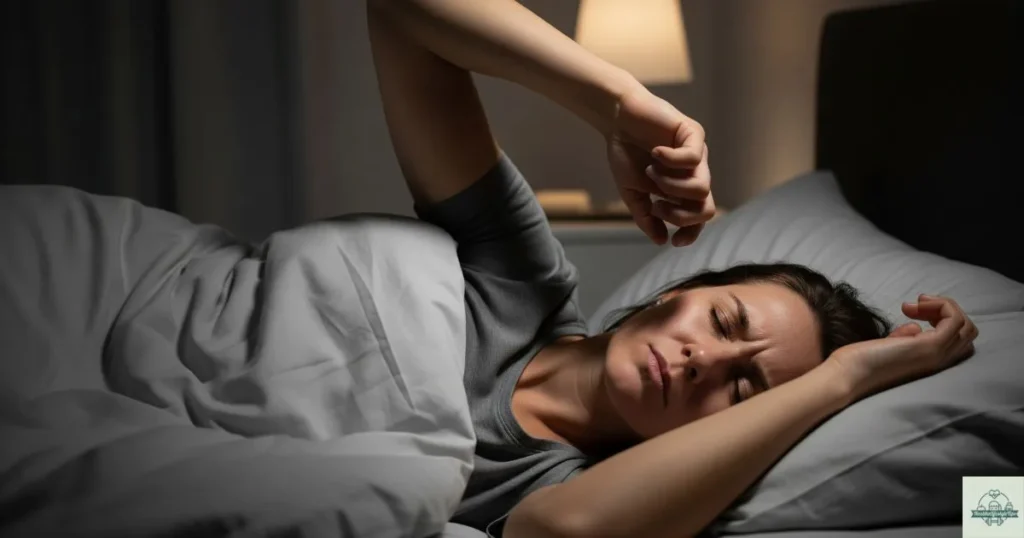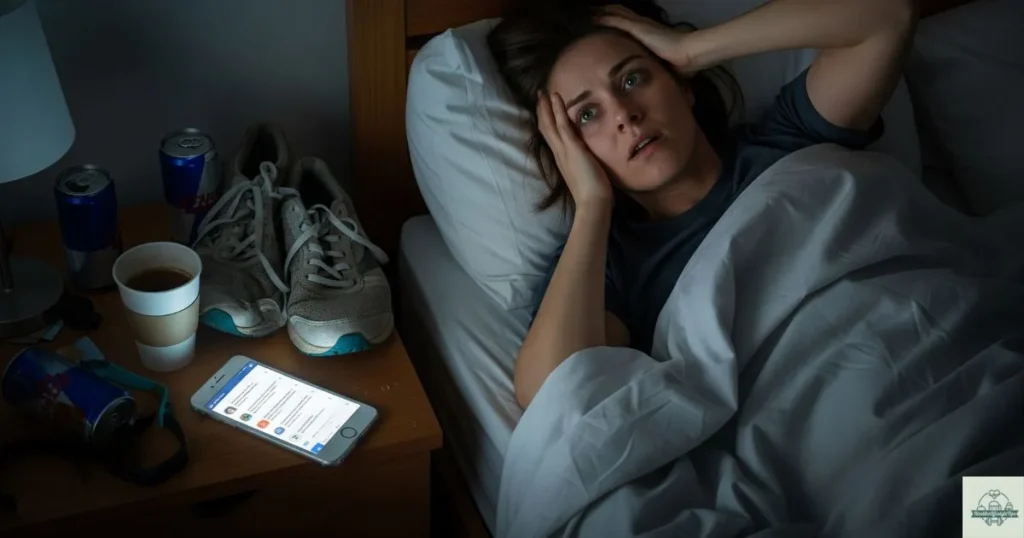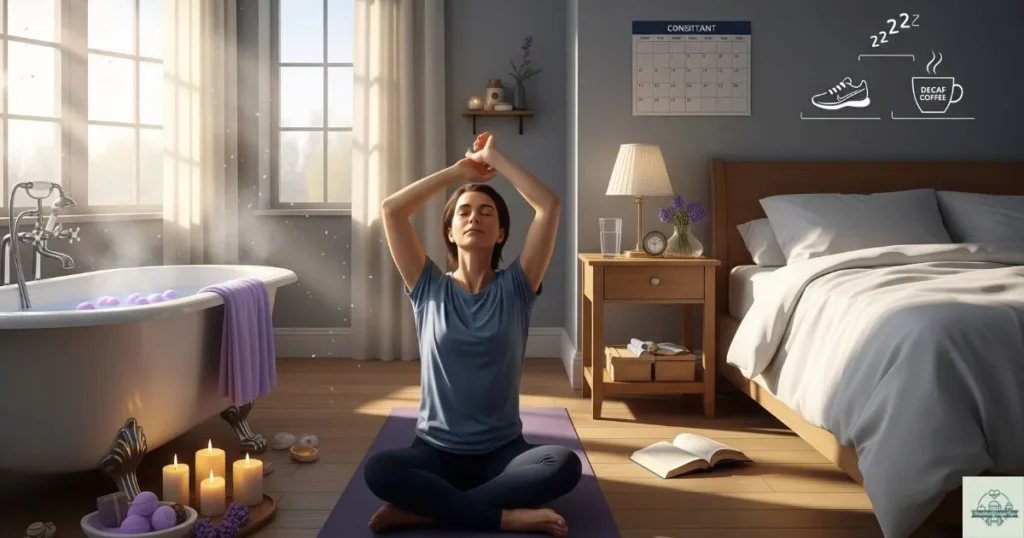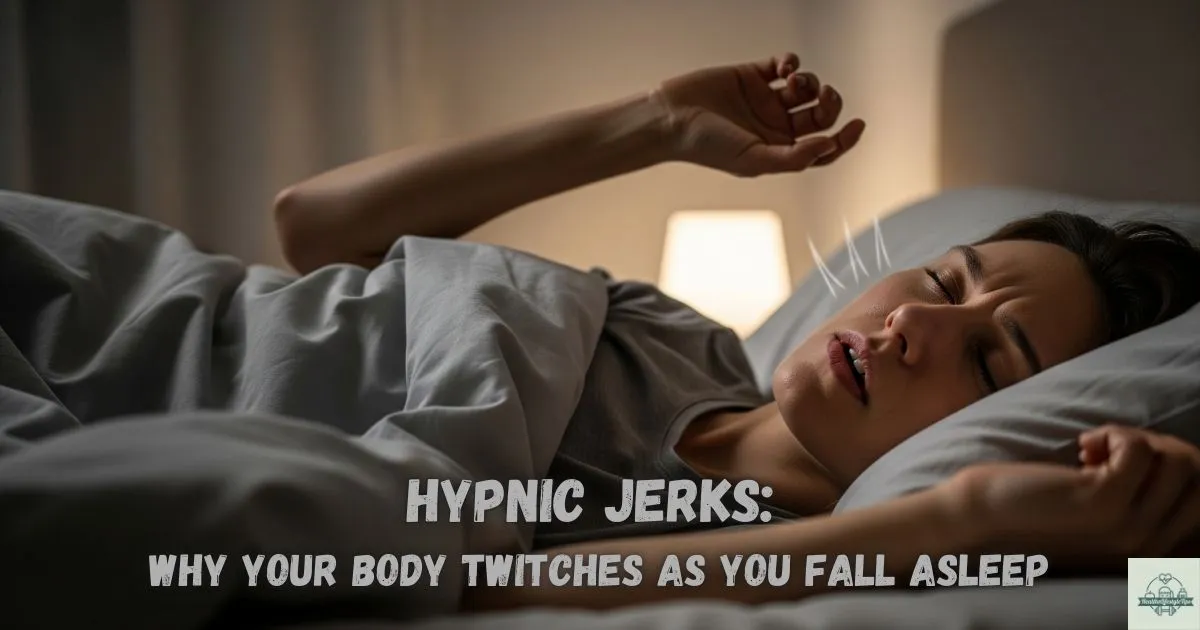Hypnic jerks are sudden, involuntary muscle twitches as you fall asleep. They happen when your brain misinterprets muscle relaxation as a fall, triggering a jolt. They’re common, harmless, and often linked to stress, fatigue, or stimulants like caffeine.
Sometimes it feels like you’re falling, or a surprising twitch. If that sounds familiar, you’re not alone. This startling experience has a name: hypnic jerks.
Most have felt this strange sensation and wondered, “What happened?” It can be a little unsettling, but there’s a simple explanation. People often search for answers because it feels odd, but these sleep twitches are a regular part of how our bodies power down for the night. Let’s dive into what’s happening when your body does a little dance right before dreamland.
The Science of Sleep Twitches

The Hypnagogic State: The Land Between Wake and Sleep
To understand hypnic jerks, we need to talk about the special time when you’re not quite awake but not fully asleep either. This is called the “hypnagogic state.” Think of it as a waiting room between your busy day and a night of deep rest. During this transition, your brain switches from “go mode” to “sleep mode.”
As you drift off, your brain signals your muscles to relax. This is a good thing! It’s what keeps you from acting out your dreams. But sometimes, the signals get mixed up. Your brain tries to shut things down for the night, but one part might still be too alert. This miscommunication can cause a sudden muscle twitch.
Why Your Brain Thinks You’re Falling
Have you ever had a mini-dream that you were tripping or falling right before the jerk? That’s a super common part of the experience. One of the main theories behind hypnic jerks is that as your muscles relax completely, your brain sometimes gets confused. It misinterprets this sudden relaxation as a sign that you are actually falling.
In response, your brain sends a powerful signal to your muscles to “catch yourself!” This causes a sudden, sharp jolt that wakes you up. It’s like a fire drill in your brain—a false alarm that feels real momentarily. This startle reflex is just your brain trying to protect you, even when there’s no danger.
Are Hypnic Jerks a Sign of a Sleep Disorder?
It’s easy to worry that these twitches signify something more serious. But here’s the good news: for the vast majority of people, hypnic jerks are entirely normal and harmless. They are not considered a sleep disorder. In fact, up to 70% of people experience them occasionally.
So, is it normal to jerk awake while sleeping? Absolutely. It’s a quirk in the process of falling asleep. Only when they happen so often that they prevent you from getting enough rest should you look into the causes.
What Causes and Triggers These Twitches?
While these sleep starts are regular, certain things can make them happen more often. These are things that make your brain a little jumpy at bedtime.

Common Causes of Hypnic Jerks
- Stress and Anxiety: When stressed or anxious, your brain has difficulty switching off. It stays on high alert, making it more likely to misfire as you fall asleep.
- Sleep Deprivation and Fatigue: Are you super tired? Ironically, being exhausted can make hypnic jerks more frequent. When your body is desperate for rest, the transition to sleep can be more chaotic.
- Caffeine, Nicotine, and Other Stimulants: That afternoon coffee or late-night soda could be to blame. Stimulants like caffeine and nicotine wake up your brain and can stay in your system for hours, making it harder for your nervous system to relax peacefully.
- Vigorous Exercise Before Bed: Exercise is excellent for sleep, but a really intense workout right before you hit the hay can leave your muscles and brain too energized to wind down smoothly.
When to Pay a Little More Attention
Frequent and powerful jerks could be related to other things in rare cases. Certain medications can sometimes cause them as a side effect. If your sleep twitches are paired with other unusual symptoms, it might be worth mentioning to a doctor, but for most people, the cause is one of the simple triggers listed above.
How Does Sleep Start Affect Your Sleep?
For most, a hypnic jerk is a brief, weird moment before they fall right back asleep. But what happens when they become a regular nightly visitor?
Can Hypnic Jerks Lead to Insomnia?
If these twitches happen frequently or are very strong, they can disrupt sleep. You might start feeling anxious about going to bed, worried that you’ll be awake again. This can create a frustrating cycle: you worry about the jerks, which makes you anxious, and that anxiety can lead to more jerks. Over time, this can make it hard to fall asleep, a condition known as insomnia.
This constant disruption can also affect your overall sleep quality. Even if you fall back asleep quickly, being startled awake repeatedly can prevent you from reaching the deeper, more restorative stages of sleep. This can leave you feeling tired and groggy the next day.
What About Your Sleep Partner?
You might not be the only one affected. A strong hypnic jerk can be powerful enough to shake the bed and wake up the person sleeping next to you. It can be startling for them, too! If your nightly twitches disrupt your partner, it’s another good reason to look for ways to calm them down.
How to Prevent and Manage Hypnic Jerks
You might not be able to stop them completely, but you can take steps to make them less frequent. Here are some simple solutions.

Reduce the Frequency of Hypnic Jerks
- Relaxation Techniques Before Bed: Teach your brain and body to chill out. Try deep breathing exercises, gentle stretching, or listening to calming music before you turn out the lights. A warm bath can also work wonders.
- Improve Your Sleep Hygiene: This means creating good habits around sleep. Stick to a consistent sleep schedule (even on weekends!), make sure your bedroom is dark, quiet, and cool, and avoid screens for at least an hour before bed.
- Manage Stress and Anxiety: Find healthy ways to deal with stress during the day so it doesn’t follow you to bed. This could be anything from a short walk, talking with a friend, or journaling.
Lifestyle Changes to Minimize Triggers
- Reduce Caffeine and Alcohol Intake: Avoid caffeine, especially after 2 p.m. While alcohol might make you feel sleepy at first, it can disrupt your sleep later in the night and make hypnic jerks more likely.
- Adjust Your Exercise Routine: If you love an evening workout, try to finish it at least 90 minutes before bedtime. This gives your body enough time to cool down and relax.
When to See a Doctor
If your hypnic jerks are causing you severe anxiety, consistently keeping you from sleeping, or if you’re experiencing other symptoms that worry you, it’s a good idea to chat with a healthcare professional. They can help rule out any other issues and offer more personalized advice.
Read More: Factors to Consider When Looking for Your Go-to Emergency Room
FAQs About Hypnic Jerks
Why does my body jerk before I fall asleep?
It’s usually because your brain misinterprets your relaxing muscles as a sign of falling. Your brain tries to “save” you with a jolt!
Are hypnic jerks dangerous?
Nope! They are harmless and very common. They might startle you, but they won’t hurt you.
Can hypnic jerks be prevented entirely?
Probably not completely, as they are a natural part of falling asleep for many people. However, you can make them happen a lot less often by managing stress, cutting back on caffeine, and improving your sleep habits.
Why do hypnic jerks feel like you’re falling?
Hypnic jerks often feel like you’re falling because your brain misinterprets the relaxation of your muscles as a sign of danger. It sends a jolt through your body to “catch” you, even though there’s no real threat. This is your brain being overly cautious during the transition to sleep.
Can stress make hypnic jerks worse?
Yes, stress can increase the likelihood of hypnic jerks. When stressed, your brain stays on high alert, making it more prone to overreact during the sleep transition. Managing stress through relaxation techniques can help reduce its frequency.
Are hypnic jerks a sign of a serious health problem?
In most cases, hypnic jerks are entirely normal and harmless. However, if they are frequent, severe, or accompanied by other symptoms like pain or confusion, it’s a good idea to consult a doctor to rule out underlying conditions.
Beyond the Basics: What Others Don’t Tell You
While we’ve covered the main points, there are a few more fascinating tidbits about these sleep starts. For instance, some scientists believe genetics might play a small role—if your parents had them, you might also be more likely to. The stage of your sleep cycle also matters; these jerks only happen in that light, early stage of sleep.
Interestingly, there can be a connection between these twitches and your dreams. That feeling of falling isn’t just a physical sensation; it’s often accompanied by a vivid, dream-like image of falling from a cliff or tripping down stairs. Your brain creates a story to match the physical jolt.
Your Body is Just Fine
So, the next time your body gives you a sudden kick as you’re drifting off, don’t worry. It’s not a sign that something is wrong. It’s just a little hiccup in the fantastic process of your body shutting down for a restful night. Creating a calm and consistent bedtime routine can help smooth out that transition and float peacefully into dreamland.
